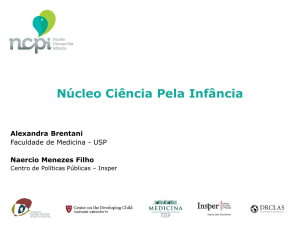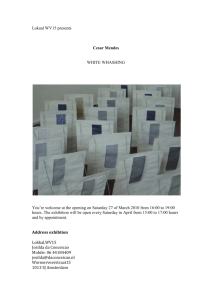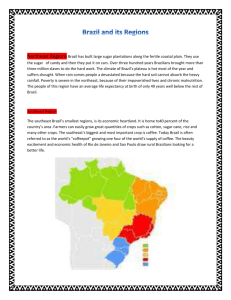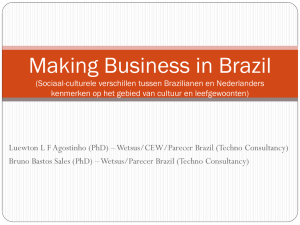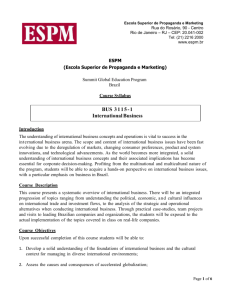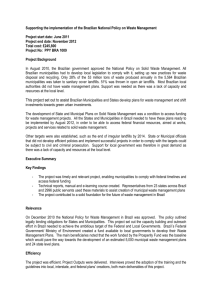CNM international 03 april 08, 2002
advertisement
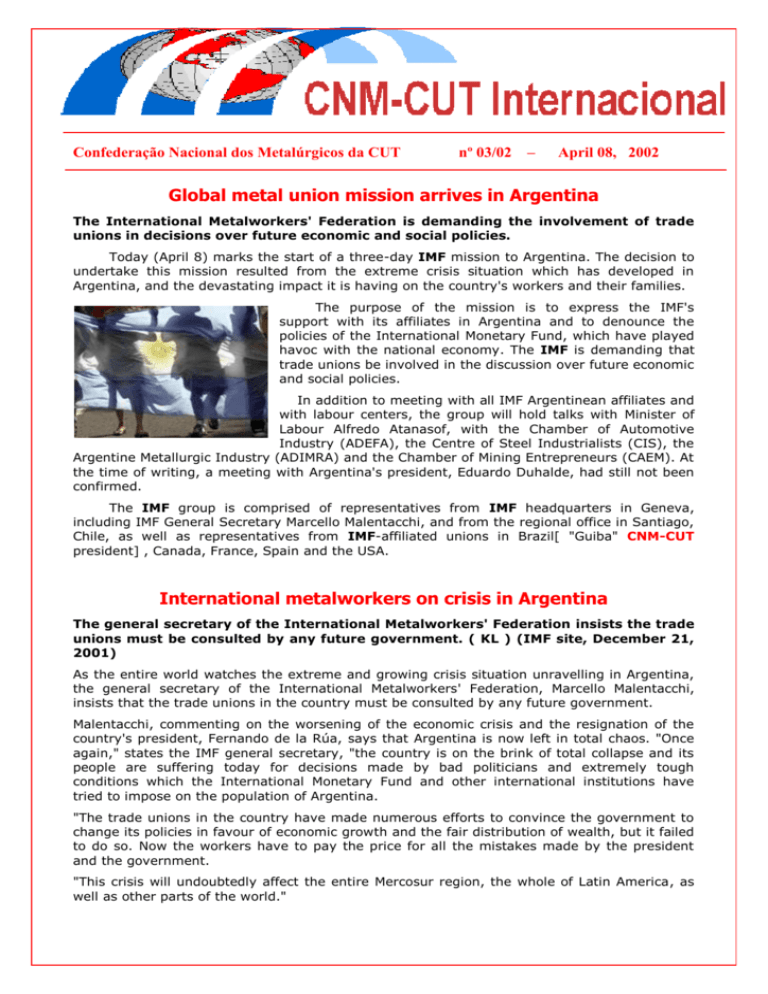
Confederação Nacional dos Metalúrgicos da CUT nº 03/02 – April 08, 2002 Global metal union mission arrives in Argentina The International Metalworkers' Federation is demanding the involvement of trade unions in decisions over future economic and social policies. Today (April 8) marks the start of a three-day IMF mission to Argentina. The decision to undertake this mission resulted from the extreme crisis situation which has developed in Argentina, and the devastating impact it is having on the country's workers and their families. The purpose of the mission is to express the IMF's support with its affiliates in Argentina and to denounce the policies of the International Monetary Fund, which have played havoc with the national economy. The IMF is demanding that trade unions be involved in the discussion over future economic and social policies. In addition to meeting with all IMF Argentinean affiliates and with labour centers, the group will hold talks with Minister of Labour Alfredo Atanasof, with the Chamber of Automotive Industry (ADEFA), the Centre of Steel Industrialists (CIS), the Argentine Metallurgic Industry (ADIMRA) and the Chamber of Mining Entrepreneurs (CAEM). At the time of writing, a meeting with Argentina's president, Eduardo Duhalde, had still not been confirmed. The IMF group is comprised of representatives from IMF headquarters in Geneva, including IMF General Secretary Marcello Malentacchi, and from the regional office in Santiago, Chile, as well as representatives from IMF-affiliated unions in Brazil[ "Guiba" CNM-CUT president] , Canada, France, Spain and the USA. International metalworkers on crisis in Argentina The general secretary of the International Metalworkers' Federation insists the trade unions must be consulted by any future government. ( KL ) (IMF site, December 21, 2001) As the entire world watches the extreme and growing crisis situation unravelling in Argentina, the general secretary of the International Metalworkers' Federation, Marcello Malentacchi, insists that the trade unions in the country must be consulted by any future government. Malentacchi, commenting on the worsening of the economic crisis and the resignation of the country's president, Fernando de la Rúa, says that Argentina is now left in total chaos. "Once again," states the IMF general secretary, "the country is on the brink of total collapse and its people are suffering today for decisions made by bad politicians and extremely tough conditions which the International Monetary Fund and other international institutions have tried to impose on the population of Argentina. "The trade unions in the country have made numerous efforts to convince the government to change its policies in favour of economic growth and the fair distribution of wealth, but it failed to do so. Now the workers have to pay the price for all the mistakes made by the president and the government. "This crisis will undoubtedly affect the entire Mercosur region, the whole of Latin America, as well as other parts of the world." Malentacchi insists that the next president of Argentina, who will have to be nominated by Parliament in the coming 48 hours, "must consult with the trade union movement in the country and ascertain the protection of the people." Brazilian workers protest against proposed labor law reforms Hundreds of members of Brazil's largest labor organization, the Central Workers' Union (CUT), paralyzed factories and highways in Sao Paulo state for several hours Thursday to protest a government bill to reform the nation's labor laws. Workers at the Volkswagen plant in Sao Bernardo do Campo, a town near Sao Paulo, downed tools for an hour, as did employees at Ford, Scania and Mercedes Benz plants in the state. Some 200 protesters blocked access to Sao Paulo International Airport for two hours, delaying thousands of passengers and airport employees. The work stoppages and roadblocks were part of a protest against the government's proposal to consolidate labor laws, which the Senate is scheduled to vote on in the next several days. According to CUT President Joao Felicio, the reforms would jeopardize benefits such as Christmas bonuses and maternity leaves and would lead to the shortening of workers' meal breaks. A group of demonstrators in Campinas blocked the road to the city's industrial district, while workers at Paulinia oil refinery - one of the country's largest - stopped work for an hour to participate in a rally. Employees at the University of Campinas and teachers from several high schools also joined in the protest, while some 300 students from the University of Sao Paulo demonstrated in front of the campus in solidarity with the workers. At least 15,000 bank employees in downtown Sao Paulo also suspended their activities for several minutes to show their support for the protest. CUT President Joao Felicio said Thursday's protest had been a "victory," and announced that workers would continue to rally to pressure the Senate not to approve the labor law reform. (EFE , march 22, 2002) Brazil's MST protests arrests in Cardoso ranch occupation Thousands of members of Brazil's Landless Workers' Movement (MST) on Tuesday protested the arrests of 16 of their companions accused of leading the occupation of a ranch owned by the family of President Fernando Henrique Cardoso. The protests took place in several cities, with special tension developing in Buritis, near the ranch that belongs to Cardoso's sons, which was taken over last weekend by 300 MST members. The demonstration in Buritis took place under heavy police guard, but was peaceful, like those in Sao Paulo and other cities. In the capital, Brasilia, scores of peasants took over a main thoroughfare on which the Congress and the presidential palace are located. The 16 MST members arrested have been charged with trespassing on private property, criminal conspiracy and vandalism as well as destruction of the property belonging to the presidential family. During their nearly 30-hour occupation of the property, the landless workers caused much destruction, as evidenced by news photos the trespassers allowed to be taken. The MST members emptied drawers, took clothing belonging to the president and his wife, Ruth de Cardoso, and slept in the beds of the presidential family. They also ate everything in sight, drank all the wine, whiskey and liquor in the house, smoked all the cigars Fidel Castro had given Cardoso and threw a big party on the spacious grounds. The occupation was denounced by the leaders of the socialist Workers' Party (PT), a traditional ally of the MST. One of the harshest criticisms came from PT presidential candidate Luiz Inacio "Lula" da Silva, who said the MST seemed to have "lost their political bearings" and insisted the workers set aside violence to fight for their rights under democratic rules. The MST justified their actions by saying they were trying to call attention to the failure of the agrarian reforms initiated by the Cardoso administration and to press demands for the equitable distribution of land and income. (EFE , march 28, 2002) Amnesty accuses Brazil's police of "torture" Amnesty International on Monday criticized conditions in police stations in the southeastern Brazilian city of Belo Horizonte, citing cases of "torture and corruption." An Amnesty delegation that visited prison cells at two police stations last October said "prisoners in these police stations continue to endure subhuman conditions - what could almost be described as a living death - in which they are denied their most basic humanity." (...)The rights group said the prison conditions were sordid, referring to the lack of medical attention and corrupt guards who Amnesty officials accused of extorting money from desperate prisoners in exchange for essential items - especially food and medicine - or for transfers to another prison cell. "What is even more disturbing, detainees told us of torture sessions carried out with beatings and electric shocks, and of windowless punishment cells where they are taken after the torture and left naked in solitary confinement for a number of days, without food," the communiqué said. Amnesty mentioned the case of a guard at one of the two prisons who "is known to have been involved in episodes of torture that took place there as long ago as 1969." The rights group added that "torture methods used in the 1960s are still in use there today." Amnesty said the Brazilian government began an anti-torture campaign in November in response to international pressure. The campaign, however, "has been undermined by poor funding and lack of a coordinated strategy, and has had very little impact on the lives of the thousands of prisoners who endure torture and ill-treatment throughout Brazil." The rights group, therefore, urged state and federal authorities to improve the conditions of detention and stop the mistreatment of prisoners by providing necessary resources and training to police and prison guards. Amnesty also called on authorities "to curb the use of excessively punitive sentencing which contributes to extreme overcrowding such as we witnessed in Belo Horizonte." Amnesty said they regretted the government's "corrupt policing methods, (which) at best have proved ineffective in tackling crime (and) at worst have fueled the spiral of crime and violence that is currently posing a major threat to social stability in the country." (EFE , march 26, 2002) Brazil's opposition Workers Party chooses presidential candidate Brazil's largest opposition party, the left-wing Workers Party, held primary elections for the first time Sunday to choose a candidate for presidential elections in October. Despite loosing in three presidential elections, former union leader Luiz Inacio "Lula" da Silva, is leading all opinion polls and considered almost certain to win his party's primary. Lula's opponent, Sao Paulo Senator Eduardo Suplicy, wasn't even mentioned as an option in opinion polls, but said on local television, he was happy the primary was being held at all. Lula tried to block primary elections, dubbing them "unnecessary," as they would only confirm the obvious. Lula in the past defended a moratorium of Brazil's foreign debt payments, but recently toned down his ideas to woe middle-class voters, saying existing contracts had to be kept. If nominated, Lula could profit from a spat in President Fernando Henrique Cardoso's governing coalition that hasn't been able to come up with a joint candidate so far. While Cardoso favors Jose Serra, his former health minister and member of his own Brazilian (news - web sites) Party for Social Democracy, the conservative Liberal Front Party (news web sites) wants the governor of the impoverished Maranhao state, Roseana Sarney to run for president. Sarney moved to third in the polls behind Lula and Serra, after her image was tarnished by a raid into a company owned by her husband Jorge Murad earlier this month, when some 1.3 million real (dlrs 570,000) in cash were found. The couple came up with six different explanations about where the money came from. Lula still counts on about 25 percent of voting intentions, but with concerns among the middle classes that his victory could disrupt Brazil's economy analysts say it might still not be enough to win in a run-off with a government candidate. Lula ran for president in 1989, 1994 and 1998. (By BERND RADOWITZ, Associated Press Writer)(AP, march 17, 2002) U.S. Cites Nations on Trade Barriers Japan, the European Union and China came in for the most criticism by the Bush administration on Tuesday in a report spotlighting trade barriers against U.S. exporters. In all, the administration cited 52 individual countries and three trading blocs for criticism in this year's National Trade Estimate Report on Foreign Trade Barriers. From the broad list, the administration will choose a much smaller number of priority negotiating areas. If consultations do not remove barriers the administration finds objectionable, the United States could bring trade cases before the World Trade Organization. Those cases could ultimately lead to economic sanctions if the United States wins its claims and the targeted country fails to correct problems. "By identifying barriers to trade, we can work with our trading partners, globally, regionally and bilaterally, to eliminate these barriers while further liberalizing our market at home,'' U.S. Trade Representative Robert Zoellick said in a statement. The report devoted 45 pages to Japan, followed by 35 pages for the 15-nation EU and 29 pages on China, the country which for the past two years has had the largest trade surplus with the United States. A senior administration trade official, who briefed reporters on condition of anonymity, said that one disturbing trend noted in the report was an increased use of sanitary standards not based on valid science to try to block exports of U.S. agriculture products. The official mentioned barriers Japan has to the import of certain U.S. apples. No decisions had been finalized on what cases the administration might bring before the WTO, the official said, but the administration is already pursuing a WTO case against Mexico over telephone company competition.In addition to the EU, the other trading blocs mentioned in the report were the Arab League, for its boycott of Israel, and the Gulf Cooperation Council. The individual countries cited were Argentina, Australia, Brazil, Bulgaria, Cameroon, Canada, Chile, China, Colombia, Costa Rica, Dominican Republic, Ecuador, Egypt, El Salvador, Ethiopia, Ghana, Guatemala, Honduras, Hong Kong, Hungary, India, Indonesia, Israel, Japan, Kazakhstan, Kenya, South Korea, Malaysia, Mexico, New Zealand, Nicaragua, Nigeria, Norway, Pakistan, Panama, Paraguay, Peru, Philippines, Poland, Romania, Russia, Singapore, South Africa, Switzerland, Taiwan, Tanzania, Thailand, Turkey, Ukraine, Usbekistan, Venezuela and Zimbabwe. On the Net: U.S. Trade Representative: http://www.ustr.gov (The New York Times , april04, 2002) For Comparison : "U.S. Barriers on Brazilian Goods and Services" Introduction by Rubens A. Barbosa, Brazilian Ambassador to the United States : "This study, as in previous years, will examine only the significant barriers impeding access to the U.S. market, which disproportionately affect a variety of sectors and products in which Brazil is especially competitive and is also a significant exporter. According to studies conducted, about 60% of all products exported from Brazil to the United States are affected, in one way or another, by tariff and non-tariff restrictions in the U.S. market. Until 1999, the imbalance in bilateral trade and the relative stagnation of overall Brazilian exports were attributed by the U.S. government to both the so-called "Brazil cost" and the alleged overvaluation of the Real relative to the U.S. dollar, thus seeking to ignore the impact of tariff and non-tariff barriers imposed on Brazilian exports to the United States. In the industrial sector, the protection of inefficient sectors of the U.S. economy continues to be based on trade remedy mechanisms. In the steel sector, in July 2001 the U.S. government initiated a safeguards investigation with the aim of protecting the U.S. steel industry from competition from imported steel products, including semi-finished products. The effects of this action are not yet known, as this investigation is still underway, but it could potentially have an impact on one of the few remaining important Brazilian export product areas, semi-finished steel products. The consequences of these measures for Brazilian exports have been devastating; exports of hot-rolled carbon steel dropped from 360,000 metric tons in 1999 to 122,000 tons in JanuaryAugust of 2000 and only 11,000 tons in the same period of 2001." On the Net: http://www.brasilemb.org/trade/barriers2001.pdf U.S. steel tariff seen hurting Brazil exports Brazilian steelmakers will have a tough time finding new export markets if widely condemned U.S. import tariffs trigger copycat trade protectionism by other countries, analysts say. Those fears were heightened on Thursday when the European Union launched a formal case in the World Trade Organisation against the U.S. move to levy tariffs for three years on up to 30 percent of the value of certain steel imports. "We should see a wave of protectionism across the world,'' said Brascan analyst Luiz Caetano. ``That (U.S.) decision limits the growth of Brazilian steelmakers.'' The U.S. tariffs announced on Tuesday will slap a tax of up to 30 percent of the value of semifinished goods on exports above 5.4 million tonnes. Brazil is Latin America's biggest steel maker. The value of Brazilian steel exports to the United States fell to $726 million in 2001 from $826 million in 2000, according to data released by the Brazilian Institute of Steelmakers. The strong possibility of retaliatory tariffs in Europe and Asia may also limit alternative markets. "What could happen are restrictions of steel trade by other countries that fear a migration of exports,'' Brazil's top trade negotiator Alfredo Graca Lima said on Wednesday. On Tuesday, a government source told Reuters the Brazilian government would challenge the U.S. tariffs at the WTO. Among the Brazilian companies which might feel the impact of the U.S. measures are leading steelmaker Companhia Siderurgica Nacional (NYSE:SID - news) and rival Companhia Siderurgica de Tubarao . Miners of iron ore, which is used to make steel, such as world No.1 Cia. Vale do Rio Doce and smaller rivals like Usiminas and its unit Cosipa , may also suffer. Brazilian steelmaker Gerdau has said it expects little impact from the U.S. tariffs due to its substantial operations within American borders which will not be hit by the levy. The company has five steelmaking plants in Florida, North Carolina and Georgia. "Brazilian steel makers are certainly going to look for other markets,'' said BES Securities analyst Cristiana Viana, ``But they won't be alone, the search will be widespread.'' Brazil produced 26.7 million tonnes of steel in 2001, about 4 percent less than it did in the previous year, the IBS said. It expects output to rise to 29.9 million tonnes in 2002. Exports totaled 9.3 million tonnes in 2001, 3.2 percent less than in 2000, with about one third going to the United States mostly in the form of semi-finished products for manufacturers to fashion into assorted goods. (Reuters, march 07, 2002) Brazil in offensive to challenge subsidies The Brazilian government is launching an unprecedented offensive to challenge US and European Union agricultural subsidies and trade incentives before the World Trade Organisation. Emboldened by a recent WTO decision that favoured Brazil in its dispute with Canada over aid to their respective aircraft manufacturers, its foreign ministry is now preparing cases against US subsidies and export credits for soya and cotton production and against European sugar exports. Brazil alleges damages in excess of $2bn (£1.4bn, E2.2bn) to its sugar and soya industries. The move reflects the government's new-found determination and confidence to pursue trade interests more aggressively after years of verbal protests did little to create freer farm trade with the US and Europe. Over the past decade, Brazil has emerged as one of the largest competitive agricultural exporters in the world, with production costs in several sectors between 10 and 45 per cent lower than in the US and Europe. Foreign ministry officials, who often complain vociferously about an unfair world trade regime, are now deftly studying the complex web of WTO rules and procedures in search of legal weapons to conquer new markets. Following the creation of a special department for trade disputes last year, the foreign ministry last month initiated consultation before the WTO over an "equalisation excise tax" that the state of Florida charges on imported frozen orange juice, of which Brazil is the world's largest exporter. "The Brazilian government is more prepared, the private sector more involved, and the public more aware than before," said Roberto Azevedo, who heads the department. It has just completed extensive studies to support its claim that the US violates WTO rules through subsidies and export credits for cotton and soya production. "They artificially increase production and depress international prices," said Mr Azevedo. "The US has not met its [farm aid] reduction commitments." Separately, Brazil claims the EU illegally subsidises and re-exports sugar that enters the EU with preferential treatment from India and from African, Caribbean and Pacific countries. As a result, it says, some 1.6m tonnes from other producers are displaced annually in the international market. Brazil says it has solid cases and is serious about pursuing them. "The political will exists and there is a high probability these cases will move ahead," said Luiz Felipe de Seixas Correa, Brazil's ambassador to the WTO. Yet it is also aware it would have to move carefully so as not to sour relations with the EU and the US ahead of the new round of WTO talks, which it hopes will make progress on farm trade. "We are more pro-active now but that doesn't mean more trigger happy," says Mr Azevedo. (By Raymond Colitt in Sao Paulo)(Financial Times, april 09, 2002) Regional Jetmaker Announces Profit Regional jetmaker Embraer SA on Tuesday announced a 70 percent rise in net profits to 1.1 billion reals ($468 million) in 2001, as a weaker local currency helped offset the crisis miring the aviation industry since Sept. 11. The 1.1 billion real net profit was equal to 16 percent of gross revenue, which in 2001 stood at 6.98 billion reals ($2.97 billion), more than 33 percent higher than 5.23 billion reals ($2.2 billion) in 2000, the company said. Operating earnings, as measured by earnings before interest, taxes, depreciation and amortization, nearly doubled to 2.1 billion reals ($893 million) from 1.1 billion reals ($468 million) in 2000. Embraer has been Brazil's largest exporter for the past three years, with about 98 percent of its revenues coming from abroad. As of Dec. 31, 2001, it had a $10.7 billion backlog for firm orders and options worth $12.7 billion. It profited from a 16 percent slide in the real last year against the U.S. dollar, which effectively bloated local currency earnings. Embraer sold 174 aircraft in 2001, including 161 of the company's ERJ regional jets. Announcing the results at a news conference, Embraer Chief Executive Mauricio Botelho said the company, currently vying with Bombardier Inc. of Canada as the world's third largest aircraft manufacturer, had "met most of the targets we had planned for the year.''(The New York Times, march 27, 2002) Bombardier chief sees slow year Jet contracts plunge: Robert Brown, Bombardier Inc. chief executive, yesterday said his company faces a slow year for new regional jet orders. "I think we'll have to tough it out, quite frankly," Mr. Brown told analysts at a meeting in Toronto. "Will there be a big order? I don't know. I doubt it." Bombardier received "firm" orders for 209 regional commercial jets and another 307 options and conditional orders during the year ended Jan. 31, according to the company's financial statements released late Tuesday. That was down sharply from 296 orders and 773 options and conditional orders in the previous year. (...)Regional jet manufacturers received total firm orders for 400 planes last year. But Bob Fay, an analyst with Canaccord Capital, said total orders could be less than one-quarter that amount this year. "There's significant balance sheet damage we have to assess at the airlines over the next two quarters," he said. Major airlines have faced financial disaster over the past six months owing to the economic slowdown, a seasonal down period and lower traffic following the 9/11 terrorist attacks. As a result, continuing weakness could lead to cuts in capital spending by the airlines, "which would raise questions about how many planes [their regional airline partners] want to add to their fleet," said Mr. Fay. "It's going to be a quiet year" for new orders. Regional jet sales account for about half the business in Bombardier's all-important aerospace division, which contributed 72% of the company's $1.26-billion in income before special items, income taxes and goodwill amortization for the year ended Jan. 31. Bombardier plans to deliver 190 of its 50- and 70-seat regional commercial planes this year, down slightly from 194 last year. But several analysts were dissatisfied with the company's explanation why the margins fell as much as they did, to 7.9% from 12% from the fourth quarter last year. "I think they're giving the planes away to make the numbers," said one analyst, who noted Bombardier sold more of its higher margin planes in the fourth quarter than the previous year and thus should have posted better results. "It doesn't make any sense," he said.(...)Bombardier's regional jet business last year was buoyed by two big orders from Northwest Airlines and Air Wisconsin -both secured with the help of financing help for the buyers courtesy of the Canadian government. The World Trade Organization has ruled Canada violated international trade laws by providing favourable financing terms to Bombardier's customers on those deals. Canada and Brazil -- the home of Bombardier's fierce competitor, Embraer -- have agreed to talks aimed at reducing the amount of financial support they lend to their favoured local aerospace heavyweights. )(Financial Times, march 21, 2002) Fairchild Dornier ailing Fairchild Dornier, the US-German regional jet manufacturer, is having more severe funding problems than previously reported. Sources close to the company claim Fairchild Dornier has only Euros 90m (Dollars 79m) in cash, according to FT Deutschland. The privately-owned company declined to comment yesterday. Chuck Pieper, chairman, is expected to report on the aircraft manufacturer's situation tomorrow at the first roll-out of its new 728 model in Oberpfaffenhofen, Bavaria. Fairchild Dornier has been affected by the development costs of a new range of 55-seat to 110-seat aircraft and through stagnating sales of its smaller 328 models. It became known in January that the US-German plane maker would need another Euros 800m-Euros 900m to see the development of its new models through, a sum industry insiders estimate to be higher than Euros 1bn. The company is also talking to a consortium of German banks over emergency credits. Fairchild Dornier said recently that there were "negotiations about further funding and for a strategic partner" but that it could not give any names or details yet. (...)EADS, the European aviation and defence consortium, is not interested in the company and Bombardier of Canada, which together with Embraer of Brazil dominates the fast-growing regional jet industry, have dismissed speculation of co-operation. Fairchild Dornier is 71 per cent owned by Clayton Dubilier Rice, the US private-equity group, and 24 per cent owned by Allianz Capital Partners, the private-equity arm of the German financial services group, which backed a Dollars 1.2bn equity and debt package for the aircraft maker in 2000. The remaining 5 per cent is held by the management and the former owners Carl Albert and the Dornier family. (By GERHARD HEGMANN)(Financial Times, march 21, 2002) Russia's Sukhoi aircraft company set to win major Brazilian defence contract Russia has a good chance to win the tender held by the Brazilian air force for the purchase of 24 supersonic fighter planes, a military-diplomatic source told ITAR-TASS today, commenting on the current visit of Brazilian Defence Minister Geraldo Quintao to Russia. According to his information, the Brazilian air force is going to sign a contract for the purchase of 24 supersonic fighter-bombers before the end of 2002. The government allocated for that purpose 700m dollars. The new aircraft are to replace the obsolete Mirage-3 planes, whose service life will be over by 2005... Experts believe that the French Mirage planes are the main rivals of the Russian planes in the tender. Russian fighter planes are not inferior to the Mirage planes by their flight and technical characteristics, and their cost is 35m dollars, while the cost of the French planes is about 50m dollars. Russia expressed willingness to import Brazilian goods and to turn over to Brazil some aircraft building technologies if the contract is concluded. Moreover, the Russian official continued, the Sukhoi corporation stated it could turn over to Brazil the technology for the production of Su-35 general-purpose fighter planes. Russian designers and producers of those planes are interested not only in their export for the Brazilian air force but also in their joint production, said Mikhail Pogosyan, head of the Sukhoi corporation. The Su-35 plane, which Sukhoi corporation is offering to Brazil, is a modernized version of the Su-30 general-purpose fighter plane.(Source: ITAR-TASS news agency, Moscow, in English 0814 gmt 9 Apr 02 ) (BBC Monitoring april 09, 2002) Brazilian banks ride storm with record year More than most, bankers in Brazil have learned to ride the economic cycles of boom and bust, and last year was no exception. With neighbouring Argentina agonising and slow growth at home (overall gross domestic product was up only 1.5 per cent, following 4.4 per cent growth in 2000), leading high street banks such as Bradesco and Itau achieved record earnings, thanks to a combination of large spreads and efficient dollar hedging. Half of the country's top 10 banks registered record profits last year, with returns on equity ranging from 17 per cent to 37 per cent. Itau, the second-largest private bank, yesterday reported net income of RDollars 2.4bn (up 30 per cent compared with 2000 and equivalent to USDollars 1.02bn), ahead of Bradesco's RDollars 2.17bn (a 25 per cent increase). "They are really strong in retail banking," says Tomas Awad, equity analyst with BBA Creditanstalt. "But they are also well diversified and offer almost a full range of financial services, which helps their stability." Itau and Bradesco have respectively acquired the asset management portfolios of Lloyds TSB and Deutsche Bank in the past six months. Bradesco alone has invested some RDollars 3bn since the beginning of the year in a series of five acquisitions. Spain's Santander Central Hispano, the largest foreign bank in Brazil, registered consolidated earnings of RDollars 1.3bn last year. Of that, 84 per cent came from Banespa, the former Sao Paulo state bank acquired in late 2000. FleetBoston's BankBoston tripled its local net income to a record Rdollars 738m, while Citibank earned RDollars 603m, up 33.5 per cent from 2000. Unlike the rest of the Brazilian economy, which has suffered from high interest rates and a slide in the local currency since it was floated in 1999, banking has been flourishing. "There has been a transfer of income from the productive sector to the financial sector," says one observer. Although credit volume has remained relatively low, it has proved extremely lucrative. "Spreads are better here than in the rest of Latin America. And the hedge market has favoured all those companies with a high degree of capitalisation," says Alvaro de Souza, a former Citibank executive who chairs the American Chamber of Commerce in Sao Paulo. Nevertheless, some banking analysts think that such euphoria may have reached its peak. The central bank has already set its benchmark interest rate on a declining trend, and a 2 per cent cut is expected this year. "Banks may maintain quite attractive profitability rates, but this may not last as spreads will fall at some point," says Mr Awad from BBA. Nevertheless, bankers sound confident they can respond well to a decline in rates, as Brazilian economic prospects brighten again. "We have not exhausted all our potential," says Gustavo Marin, president of Citibank in Sao Paulo.(By THIERRY OGIER)(Financial Times, march 06, 2002) CNM-Internacional is a bulletin edited by the International Affairs Secretariat and edited by Consultoria Econômica e Social Integrada – CESI cnmcut@ax.apc.org
